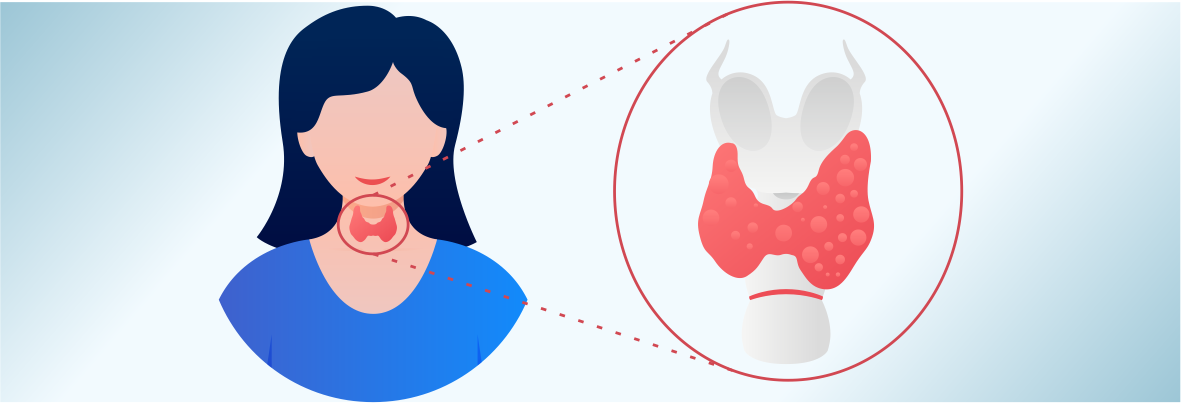T3 & T4 The thyroid gland is a small butterfly-shaped organ towards the front of the neck. It metabolises thyroid hormones which control multiple vital functions and activities in the human body, including the use of energy by organs and the rhythms surrounding the heart beating.
T3 & T4
The thyroid gland secretes three hormones: triiodothyronine (T3), thyroxine (T4), and Calcitonin. The thyroid hormones; T3 & T4 influence the metabolic rate and protein synthesis, growth, and development, especially in children. Therefore, thyroid hormones are pivotal for the normal development of a baby’s brain and nervous system during pregnancy. In addition, Calcitonin plays a vital role in calcium homeostasis. Secretion of T3 & T4 is managed by thyroid-stimulating hormone (TSH) and is secreted from the anterior pituitary gland. In turn, TSH is regulated by the thyrotropin-releasing hormone (TRH) produced by the hypothalamus.
Thyroid hormones are primarily found in a bound form, and a tiny portion, 0.03% of T4 and 0.3% of T3 travel freely (FT3 & FT4) in the blood and have hormonal activity. Moreover, T3 is produced by conversion from T4 in the body.
The functional disorders of Thyroid disease are “Hyperthyroidism,” i.e., excessive production of the thyroid hormones (T3&T4), and “Hypothyroidism,” i.e., less production of the thyroid hormones. The causes of Hyperthyroidism are Graves’ disease, toxic multinodular goitre, solitary thyroid adenoma, inflammation, pituitary adenoma, and excess intake of iodine. In addition, weight loss, increased appetite, insomnia, decreased tolerance of heat, tremors, palpitations, anxiety, and nervousness are the symptoms caused by Hyperthyroidism.
The most frequent cause of Hypothyroidism is Iodine deficiency and the autoimmune disease; Hashimoto’s thyroiditis. Other causes include iodine deficiency, congenital abnormalities, diseases causing transient inflammation, surgical removal, or radio ablation of the thyroid. The symptoms of Hypothyroidism are abnormal weight gain, tiredness, constipation, heavy menstrual bleeding, hair loss, cold intolerance, and a slow heart rate.
Scientific data from various studies indicate that 42 million (approx.) people suffer from thyroid disorders. There are four primary thyroid diseases: Hypothyroidism, Hyperthyroidism, goiter/iodine deficiency disorders, and Hashimoto’s thyroiditis. Hypothyroidism is the most commonly occurring thyroid disorder affecting 1 in 10 men & women in India. It is a causative agent for many health problems ranging from obesity, joint pain, and infertility to heart disease in the long run if left undiagnosed/untreated. However, Hypothyroidism can be easily managed by giving an oral supplement daily.
Goitre, the irregular growth of the thyroid gland due to iodine deficiency or inflammation of the thyroid gland, is one of India’s most common thyroid disorders, affecting more than 1 million cases per year. Hashimoto’s thyroiditis, an autoimmune disease, can lead to severe and life-threatening complications if not treated promptly.
The diagnosis of Thyroid disease is mainly made by Thyroid function tests which mainly include the measurement of the thyroid hormones (T3&T4) and stimulating thyroid hormone (TSH). Among these 3, TSH levels are considered the most sensitive marker of thyroid dysfunction. Since T3& T4 Hormones are bound to other molecules, and their free form is biologically active, free T3(FT3) and free T4 (FT4) levels can also be measured in case of any abnormality in results &/or pregnancy.
J.Mitra & Co. offers ELISA & Fluorescence immunoassay (FIA) based test kits for the Quantitative determination of T3, T4 & TSH in Human Serum/ Plasma.
ELISA test kits have user-friendly test procedures with less than 80 minutes turnaround time for 90 samples. On the other hand, FIA-based Quanti card tests are more suitable for labs with less workload and fast reporting of patient test results in less than 50 minutes.
All kits are indigenously developed and have good precision and accuracy in test results.
Though diagnosis of Thyroid disease has increased due to increased awareness among the population, there is still a significant proportion of persons left undiagnosed either due to lack of symptoms in the initial stage or not aware of the disease. Nevertheless, thyroid problems can be managed well with proper diagnosis and timely treatment.

